2017 年云南昆明理工大学翻译硕士英语考研真题 A 卷
Part Ⅰ Vocabulary and Structure
In this section, there are thirty incomplete sentences. For each sentence four
alternativesaregiven.DecidewhichofthealternativesA,B,CorDbestcompletes
the sentence. Write the appropriate letter on the ANSWER SHEET.
(1x30=30 points)
1. Prof. Ward hardly ever went to ________ the theatre.
B. either the cinema nor
D. either the cinema or
A. neither the cinema nor
neither the cinema or
C.
2. Your advice would be ________ valuable to him, who is at present at his wit’
s end.
A. exceedingly
B. excessively
C. extensively
D. exclusively
3. The monopoly-capitalist group ______ many smaller enterprises last year.
A. integrated
B. merged
C. combined
D. collected
4. This watch is ________ to all the other watches on the market.
A. superior
B. advantageous
C. super
D. beneficial
5. Scholars maintain that social development can easily ________ language changes.
A. bring
up
B. bring about
C. bring out
D. bring
forward
6. They are a firm of good repute and have large financial ________.
A. reserves
B. savings
C. storages
D. resources
7. The bus moved slowly in the thick fog. We arrived at our ________ almost two
hours later.
A.
designation
B. destiny
C. destination
D. dignity
8. The government is trying to do something to ________ better understanding
between the two countries.
A. raise
B. promote
increase
C. heighten
D.
9. Every man in this country has the right to live where he wants to, ________ the
color of his skin.
A. with the exception of
D. regardless of
B. in the light of
C. by virtue of
That sound doesn’t ________ in his language, so it’s difficult for him to
10.
pronounce it.
B. happen
B. occur
C. have
D.
take place
11. My students found the book ________; it provided them with an abundance of
information on the subject.
C. enlightening
B. confusing
C. distracting
D.
amusing
12.
I _______ you that the goods will be delivered next week.
A. insist
B. confirm
C. assure
�
D. ensure
13. Using extremely different decorating schemes in adjoining rooms may result in
________ and lack of unity in style.
D. conflict
B. confrontation
disharmony
C. disturbance
D.
14. The rules stated that anyone who had held office for three years was not ______
for reelection.
A. admirable
B. eligible
C. reliable
D. capable
15. Negro slavery, many claimed, was good for all ________.
A. concerned
B. is concerned
C. to concern
D. that
concerns
16. I am sure I can ________ him into letting us stay in the hotel for the night.
A. speak
B. say
C. talk
D. tell
17. The director was critical ______ the way we were doing the work.
A. at
B. in
C. of
D. with
18. In a sudden ________ of anger, the man tore up everything within reach.
A. attack
B. burst
C. split
D. blast
19. The farmers were more anxious for rain than the people in the city because they
had more at ________.
A. danger
B. stake
C. loss
D. threat
20. I felt ________ to death because I could make nothing of the chairman’s speech.
A. fatigued
B. tired
C. exhausted
D. bored
21. When the engine would not start, the mechanic inspected all the parts to find
what was at ________.
A .wrong
B. trouble
C. fault
D. difficulty
22. When we listen to music, we are easily ______ of events in the past.
D. reminded
A. remembered
C. memorized
B. reflected
23. They gave ________ broadcast while the performance was in process on the stage.
A. live
B. living
C. lively
D. alive
24. Travelling and meeting new people ________ the mind of young people.
A. expanded
B. enlarged
C. broadened
D. extended
25. Dr. Smith failed many times but he finally ________ to find a successful way
to solve the problem.
A. broke off
B. broke down
C. broke out
D. broke through
26. Peter will ________ as managing director when Bill retires.
A. take off
B. take over
C, take to
D. take up
27. Benjamin Franklin, tactless in his youth, became so diplomatic, so ________
at handling people that he was made American Ambassador to France.
A. adroit
C. considerate
B. shrewd
D. foxy
28. Complicated ________ it is, the problem can be solved in only 2 hours with an
electronic computer.
A. like
B. as
C. however
D. even if
29. Mary has brown hair. In fact, it’s quite similar in shape ________ yours.
A. with
B. to
C. like
D. as
�
30. That trumpet player was certainly loud, but I wasn’t bothered by his loudness
________by his lack of talent.
A. as
B. than
C. rather than
D. so much as
Reading Comprehension ( 40 points )
Part II
SectionA:Inthissection,therearethreepassages.Eachpassageisfollowedby
somequestionsorunfinishedstatements. Foreachofthem there are fourchoices
marked A, B, C and D. You should decide on the BEST choices and then write the
appropriate answer on the ANSWER SHEET.
(2x15
=30
points)
Passage 1
Housing is recognized as a “socially determinant variable”. In France, housing
is the main item of expenditure in the family budget (accounting for an average
of 29 percent), and many families would be unable to find decent housing without
help from the State. For a long time, the main problem was the housing shortage
but in recent years the deterioration of housing conditions has been even greater
cause for concern.
Despite extensive construction programs, the problem of housing for the most
underprivileged population groups has not been solved. According to the so-called
Petrequin Report, between 2 and 3 million families had serious difficulties meeting
their housing costs and were living in precarious and uncomfortable conditions.
Policies designed to address the housing problem have shifted over the past
few decades from a macroeconomic approach promoting construction to housing
subsidies. The reasons for this shift can be betrayed to a determination to limit
public spending and to avoid some of the perverse effects of macroeconomic policies.
The State has to some extent ceased to finance housing, especially the construction
of new projects, with the result that the cost is now chiefly and directly borne
by the family budget. Many underprivileged families, which were excluded from
low-rent housing for various reasons (selection of tenants, saturation of existing
capacity, insolvency), had no alternative but to purchase their own home and were
encouraged to do so without restraint by the then easy terms of housing loans. The
housing sector thus contributed to the development of the “economy of indebtedness”.
It should indeed be emphasized that “widespread home ownership through recourse
to borrowing could only be to the detriment of low-income families”.
In Belgium, the quality of housing, considered the prime indicator of housing
deprivation, leaves much to be desired. Low-rent housing projects have been cut
back as part of the austerity(缩减) policy pursued by the national and regional
governments, and low-income households are finding it increasingly difficult to
find somewhere to live. The number of homeless has also taken on alarming proportions.
An estimated 3,000 persons spend the night in refuges, but the figure is probably
much higher. Moreover, the number of homeless women and young persons is increasing.
�
1. According to the passage, housing is ______.
A. solved socially and perfectly
C. not determining in the social life
B. unchangeable
D. socially determinant and
changeable
2. In recent years, the main problem about housing is ______.
A. the housing shortage
B. the deterioration of housing
conditions
C. the ineffectiveness in the construction programs
D. the shortage of housing
subsidies
3. The main approach taken by governments to address the housing is ______.
A. extensive construction programs
B. housing subsidies and
loans
C. limiting public spending
D. restraining housing
purchasing
4. According to the passage, which of the following statements is Not true?
A. Widespread home ownership through recourse to borrowing led to the detriment
of low-income families.
B. I Belgium, low-rent housing projects have been cut back by the national and
regional governments for the number of number of homeless has decreased
greatly.
C. Despite extensive construction programs, the problems of housing for poor
people has not been solved.
D. Many underprivileged families, excluded from low-rent housing for various
reasons had to buy their own home with the help of the housing loans.
5. The subject of the passage is ______.
A. housing
C. family income
Passage 2
B. family budget
D. under-privilege
The liberal view of democratic citizenship that developed in the 17th and 18th
centuries was fundamentally different from that of the classical Greeks. The pursuit
of private interests with as little interference as possible from government was
seen as the road to human happiness and progress rather than the public obligations
and involvement in the collective community that were emphasized by the Greeks.
Freedom was to be realized by limiting the scope of governmental activity and
political obligation and not through immersion in the collective life of the polis.
The basic role of the citizen was to select governmental leaders and keep the powers
and scope of the public authority in check. On the liberal view, the rights of
citizens against the state were the focus of special emphasis.
Over tie, the liberal democratic notion of citizenship developed in two
directions. First, there was a movement to increase the proportion of members of
society who were qualified to participate as citizens—especially through extending
the right of voting—and to ensure the basic political equality of all. Second,
there was a broadening of the legitimate activities of government and a use of
�
governmental power to redress imbalances in social and economic life. political
citizenship became an instrument through which groups and classes with sufficient
numbers of votes could use the state power to enhance their social and economic
well-being.
Within the general liberal view of democratic citizenship, tensions have
developed over the degree to which government can and should be used as an instrument
for promoting happiness and well-being. Political philosopher Martin Diamond has
categorized two views of democracy as follows. On the one hand, there is the
“libertarian” perspective that stresses the private pursuit of happiness and
emphasizes the necessity for restraint on government and protection of individual
liberties. On the other hand, there is the “majoritarian” view that emphasizes
the “task of the government to uplift and aid the common man against the malefactors
of great wealth.” The tensions between these two views are very clear today.
Taxpayer revolts and calls for smaller government and less government regulation
clash with demands for greater government involvement in the economic marketplace
and the social sphere.
6. The author’s primary purpose is to ______.
A. study ancient concepts of citizenship
B. contrast different notions
of citizenship
C. criticize modern libertarian democracy
D. describe the importance of
universal suffrage
7. It can be inferred from the passage that the Greek word polis means ______.
A. family life
C. marriage
B. military service
D. political community
8. The author cites Martin Diamond because the author ______.
A. regards Martin Diamond as an authority on political philosophy
B. wishes to refute Martin Diamond’s views on citizenship
C. needs a definition of the term “citizenship”
D. wants voters to support Martin Diamond as a candidate for public office
9. According to the passage, all of the following are characteristics of the liberal
idea of government that would distinguish the liberal idea of government from
the Greek idea of government Except ______.
A. the emphasis on the rights of private citizens
B. the activities government may legitimately pursue
C. the obligation of citizens to participate in government
D. the size of the geographical area controlled by a government
10. A majoritarian would be most likely to favor legislation that would _____.
A. eliminate all restrictions on individual liberty
B. out spending for social welfare programs
C. provide greater protection for consumers
D. raise taxes on average worker and cut taxes on business
Passage 3
�
When we are speaking casually, we call Nineteen Eighty-four a novel, but in
a more exacting context we call it a political fable. This requirement is not denied
by the fact that the book is preoccupied with an individual, Winston Smith, who
suffers from a varicose ulcer(静脉曲张性溃疡), nor by the fact that it takes account
of other individuals, including Julia, Mr. Charrington, Mrs. Parsons, Syme, and
O’Brien. The figures claim our attention, but they exist mainly in their relation
to the political system that determines them. It would indeed be possible to think
of them as figures in a novel, though in that case they would have to be imagined
in a far more diverse set of relations. They would no longer inhabit or sustain
a fable, because a fable is a narrative relieved of much contingent detail so that
it may stand forth in an unusual degree of clarity and simplicity. A fable is a
structure of types, each of them deliberately simplified, lest a sense of difference
and heterogeneity reduce the force of the typical. Let us say, then, that Nineteen
Eighty-four is a political fable projected into a near future and incorporating
historical references mainly to document a canceled past.
Since a fable is predicated upon a typology, it must be written from a certain
distance. The author cannot afford the sense of familiarity which is caused by detail
and differentiation. A fable, in this respect, asks to be compared to a caricature,
not to a photograph. It follows that in a political fable there is bound to be some
tension between a political sense, which deals in the multiplicity of social and
personal life, and a sense of fable, which is committed to simplicity of form and
feature. If the political sense were to prevail, the narrative would be drawn away
from fable into the novel, at some cost to its simplicity. If the sense of fable
were to prevail, the fabulist(寓言家) would station himself at such a distance
from any imaginary conditions in the case that his narrative would appear unmediated,
free of conditions. The risk in that procedure would be considerable: a reader might
feel that the fabulist has lost interest in the variety of human life and fallen
back upon an unconditioned sense of its types, that he has become less interested
in lives than in a particular idea of life. the risk is greater still if the fabulist
project his narrative into the future: the reader can’t question by appealing to
the conditions of life he already knows. He is asked to believe that the future
is another country and that “they just so things differently there.”
In a powerful fable the reader’s feeling is likely to be mostly fear: he is
afraid that the fabulist’s vision of any life that is likely to arise may be accurate
and will be verified in the event. The fabulist’s feeling may be more various.
Such a fable as Nineteen Eighty-four might arise fro disgust, despair, or
would-weariness induced by evidence that nothing, despite one’s best efforts, has
changed and that it is too late now to hope for the change one wants.
11. Which of the following would be the most appropriate title for the passage?
A. A Critical Study of the Use of Characters in Nineteen Eighty-four
B. Nineteen Eighty-four: Political fable Rather Than Novel
C. The use of Typology in the Literature of Political Fables
D. Nineteen Eighty-four: Reflections on the Relationship of the Individual to
�
Society
12. Which of the following best explains why the author mentions that Winston Smith
suffers from a varicose ulcer?
A. To demonstrate that a political fable must emphasize type over detail
B. To show that Winston Smith has some characteristics that distinguish him as
an individual
C. To argue that Winston Smith is no more important than any other character
in Nineteen Eighty-four
D. To illustrate one of the features of the political situation described in
Nineteen Eighty-four
13. The “tension” that the author mentions (para. 2) refers to the ______.
A. necessity of striking a balance between the need to describe a political
situation in simple terms and the need to make the description realistic
B. reaction the reader feels because he is drawn to the characters of the fable
as individuals but repulsed by the political situation
C. delicate task faced by a literary critic who must interpret the text of a
work while attempting to describe accurately the intentions of the author
D. danger that too realistic a description of a key character will make the reader
feel that the fable is actually a description of a key character will make the
reader feel that the fable is actually a description of his own situation
14. The author’s attitude toward Nineteen Eighty-four can be best described as
______.
A. condescending
C. scholarly
B. disparaging
D. ironic
15. The author uses the phrase “another country” in the last sentence in the second
paragraph to describe a political fable in which ______.
A. political events described in a fable occur in a place other than the country
of national origin of the author
B. a lack of detail makes it difficult for a reader to see the connection between
his own situation and the one described in the book
C. too many minor characters created the impression of complete disorganization,
leading the reader to believe he is in a foreign country
D. the author has allowed his personal political convictions to infect his
description of the political situation
SectionB:Readthefollowingpassageandanswerthequestionsfollowedandwrite
your answers on the ANSWER SHEET.
(2x5 =10 points)
If sustainable competitive advantage depends on work-force skills, American
firms have a problem. Human-resource management is not traditionally seen as a
central to the competitive survival of the firm in the United States. Skill
acquisition is considered an individual responsibility. Labor is simply another
factor of production to be hired – rented at the lowest possible cost – much as
one buys raw materials or equipment.
The lack of importance attached to human-resource management can be seen in
�
the corporate hierarchy. In an American firm the chief financial officer is almost
always second in command. The post of head of human-resource management is usually
a specialized job, off at the edge of the corporate hierarchy. The executive who
holds it is never consulted on major strategic decisions and has no chance to move
up to Chief Executive Officer (CEO). By way of contrast, in Japan the head of
human-resource management is central – usually the second most important
executive, after the CEO, in the firm’s hierarchy.
While American firms often talk about the vast amounts spent on training their
work forces, in fact they invest less in the skills of their employees than do either
Japanese or German firms. The money they do invest is also more highly concentrated
on professional and managerial employees. And the limited investments that are made
in training workers are also much more narrowly focused on the specific skills
necessary to do the next job rather than on the basic background skill that make
it possible to absorb new technologies.
As a result, problems emerge when new breakthrough technologies arrive. If
American workers, for example, take much longer to learn how to operate new flexible
manufacturing stations than workers on Germany (as they do), the effective cost
of those stations is lower in Germany than it is in the United States. More time
is required before equipment is up and running at capacity, and the need for
extensive retraining generates costs and creates bottlenecks that limit the speed
with which new equipment can be employed. The result is a slower pace of
technological change. And in the end the skills of the bottom half of the population
affect the wages of the top half. If the bottom half can’t effectively staff the
processes that have to be operated, the management and professional jobs that go
with these processes will disappear.
1. According to the passage, what are the major problems American firms faces?
2. What is the difference between the position of human-resource management in US
and in Japan?
3. Where does the money most American firms put in training mainly go?
4. According to the passage, in training workers, what should be taken into
consideration?
5. What is the main idea of the passage?
Part Ⅲ Writing
(30 points)
SomeChineseuniversitiesareconsideringalimitontheincreasingnumberof
visitorstotheircampusesamidconcernsthatthetouristsmightdisrupttherunning
of the university.
Shouldvisitorsbebannedorrestrictedfromenteringthecampuses?Write a passage
on the issue. You should clearly state your opinion and explain the reasons for
your opinion.
�
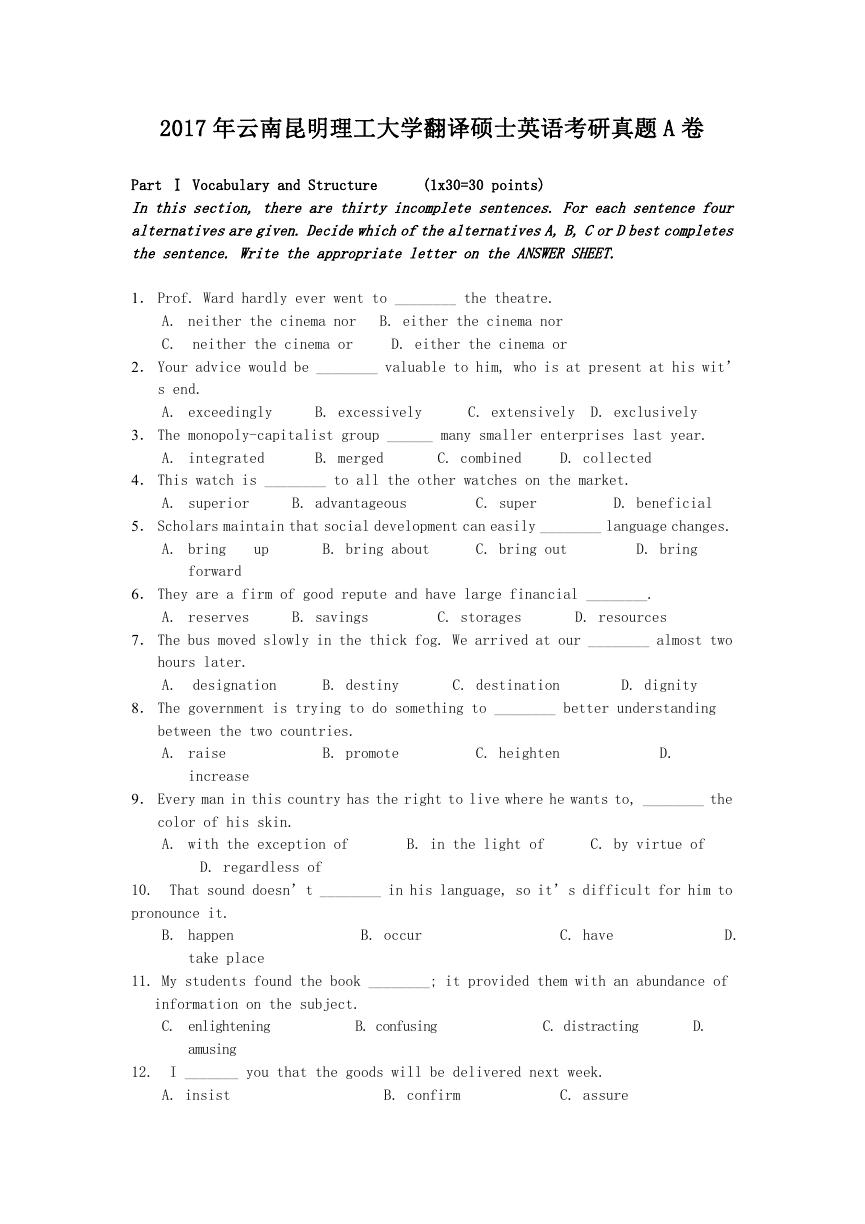
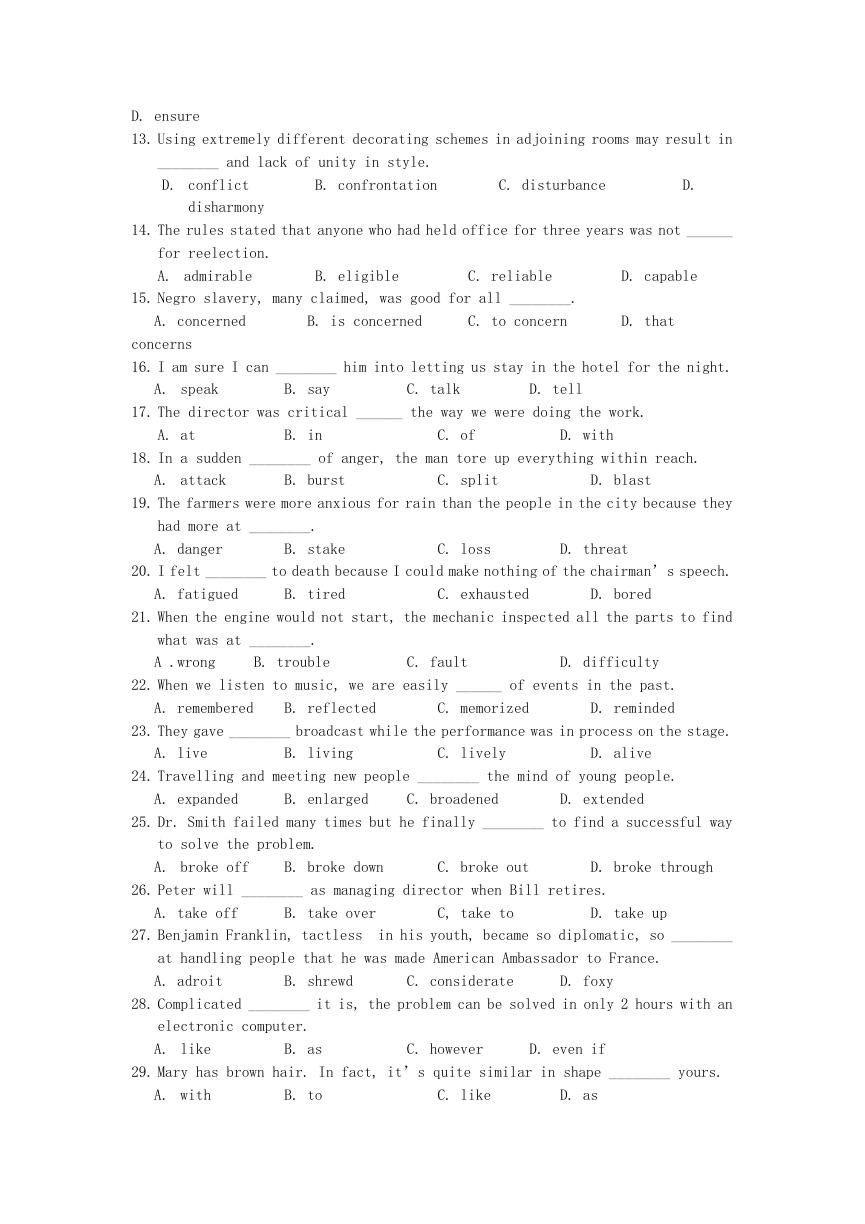
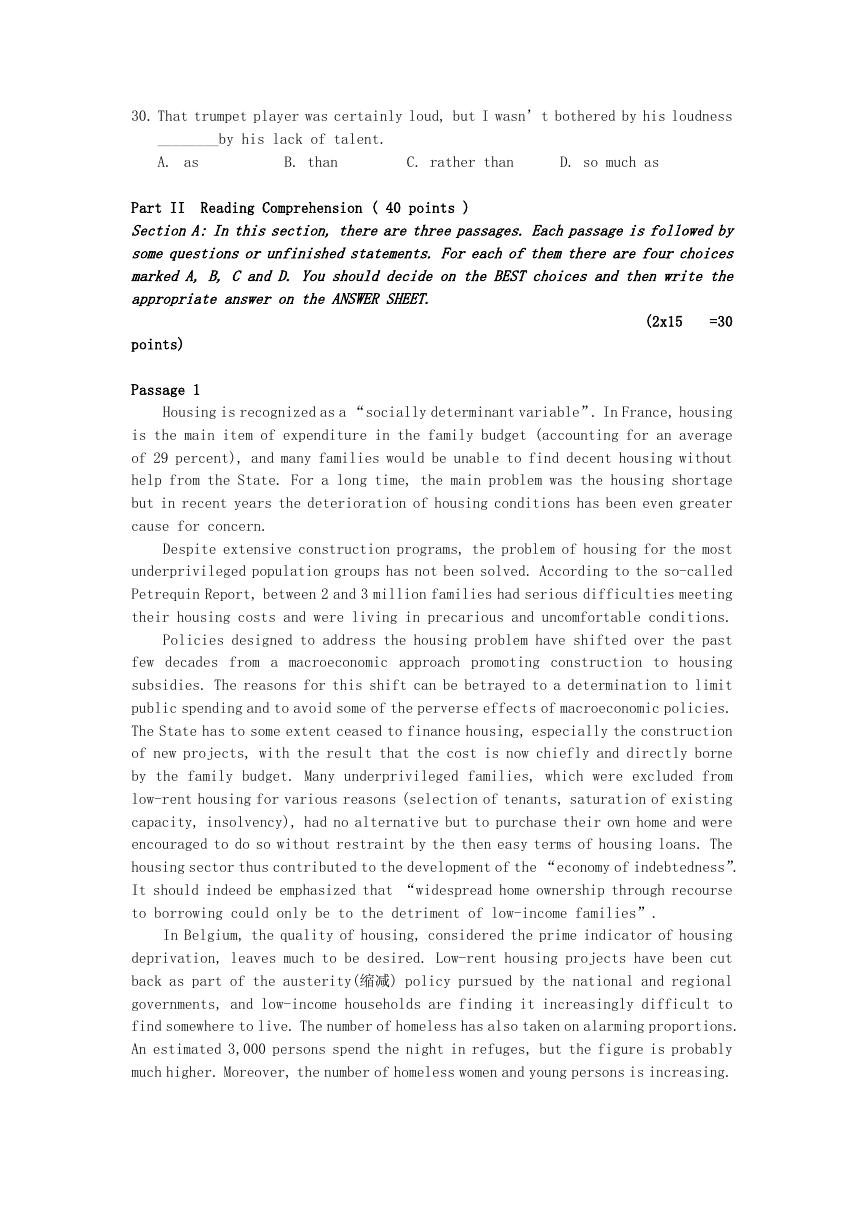
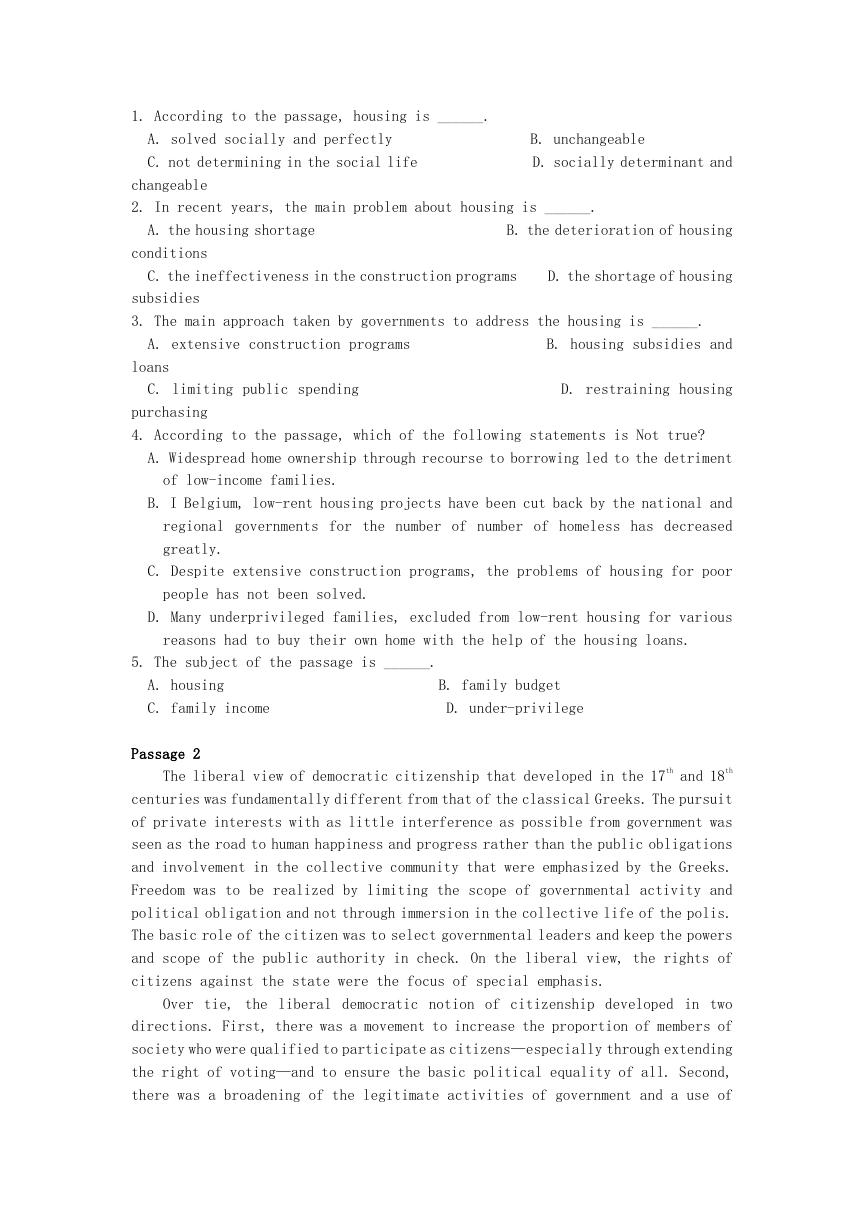
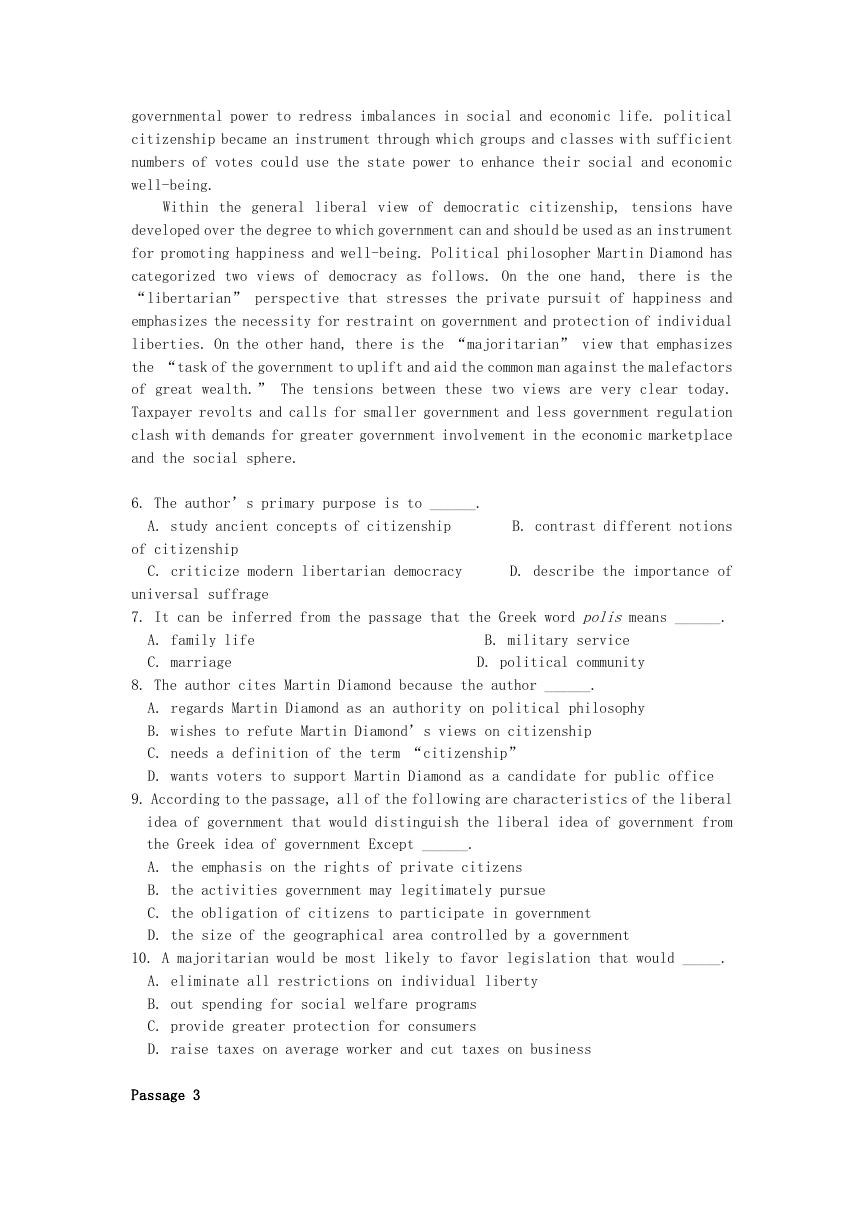
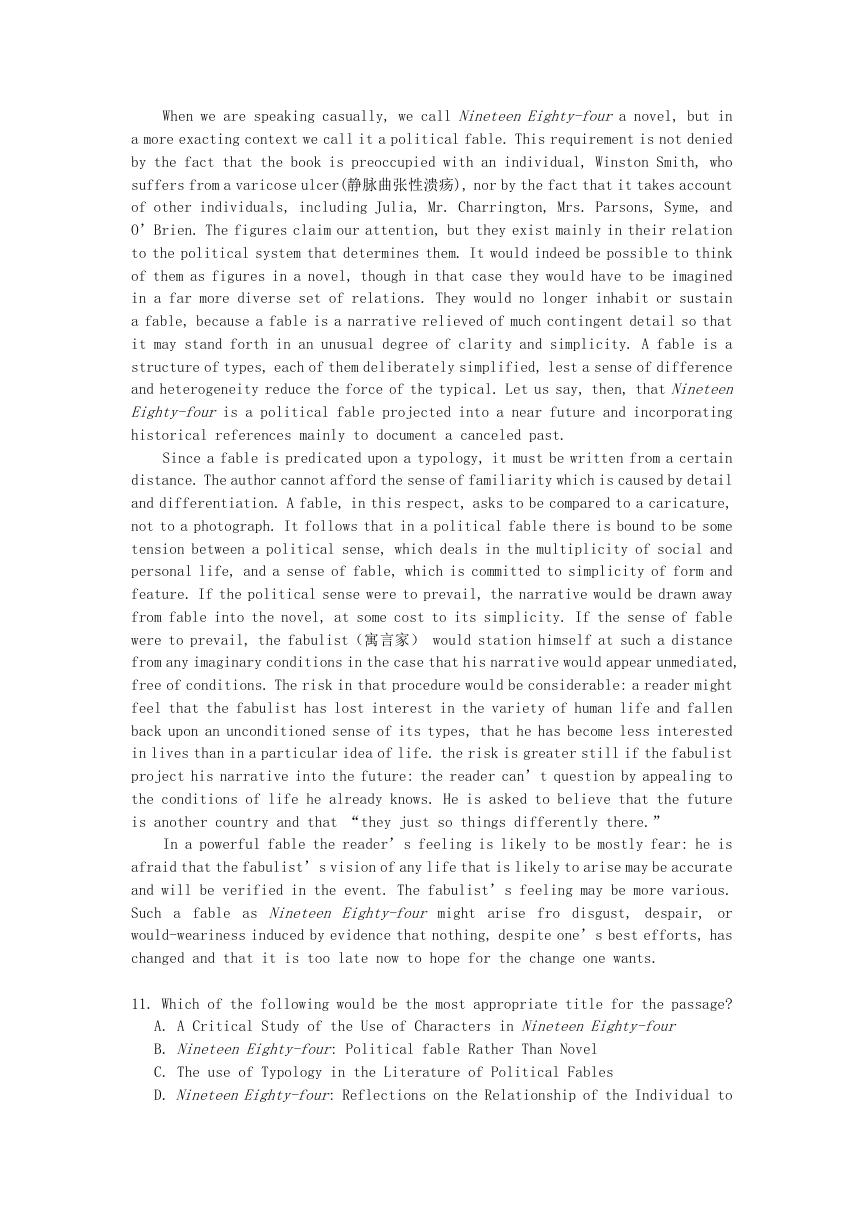
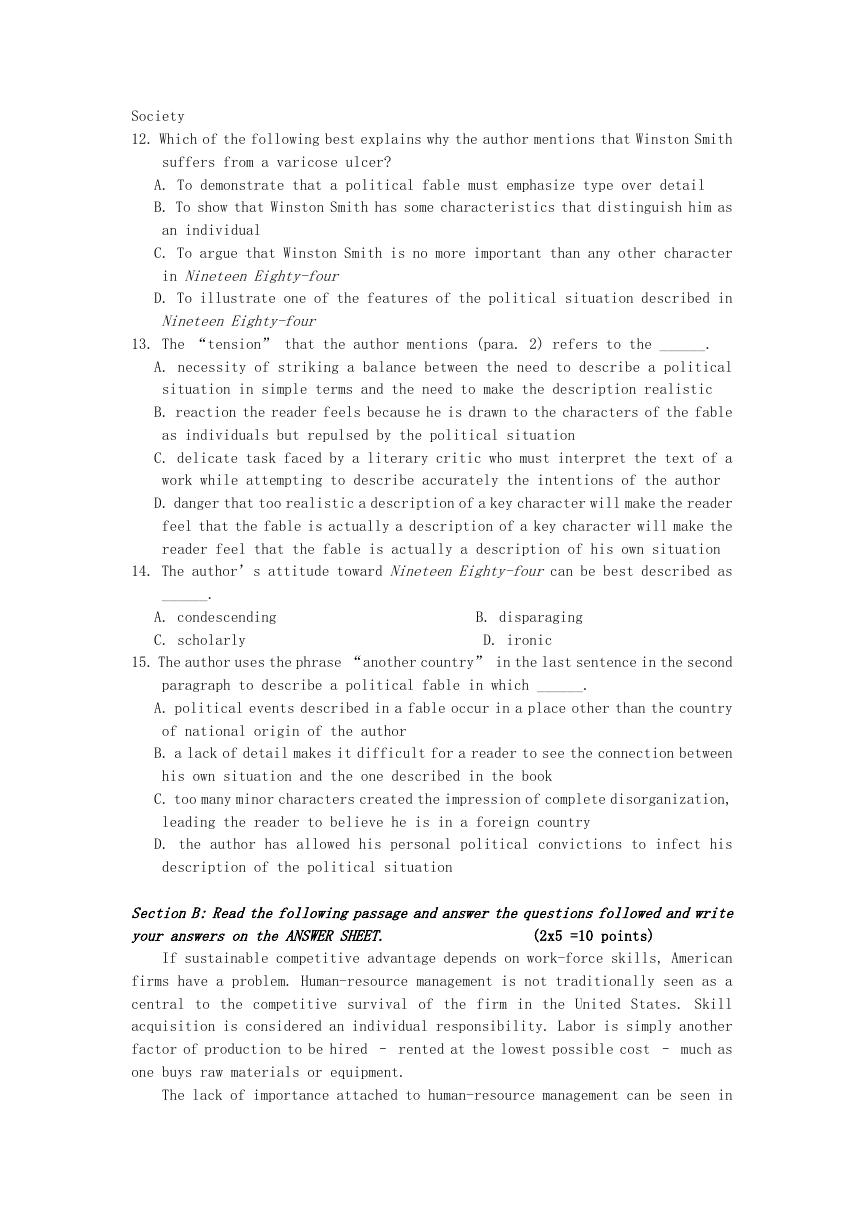
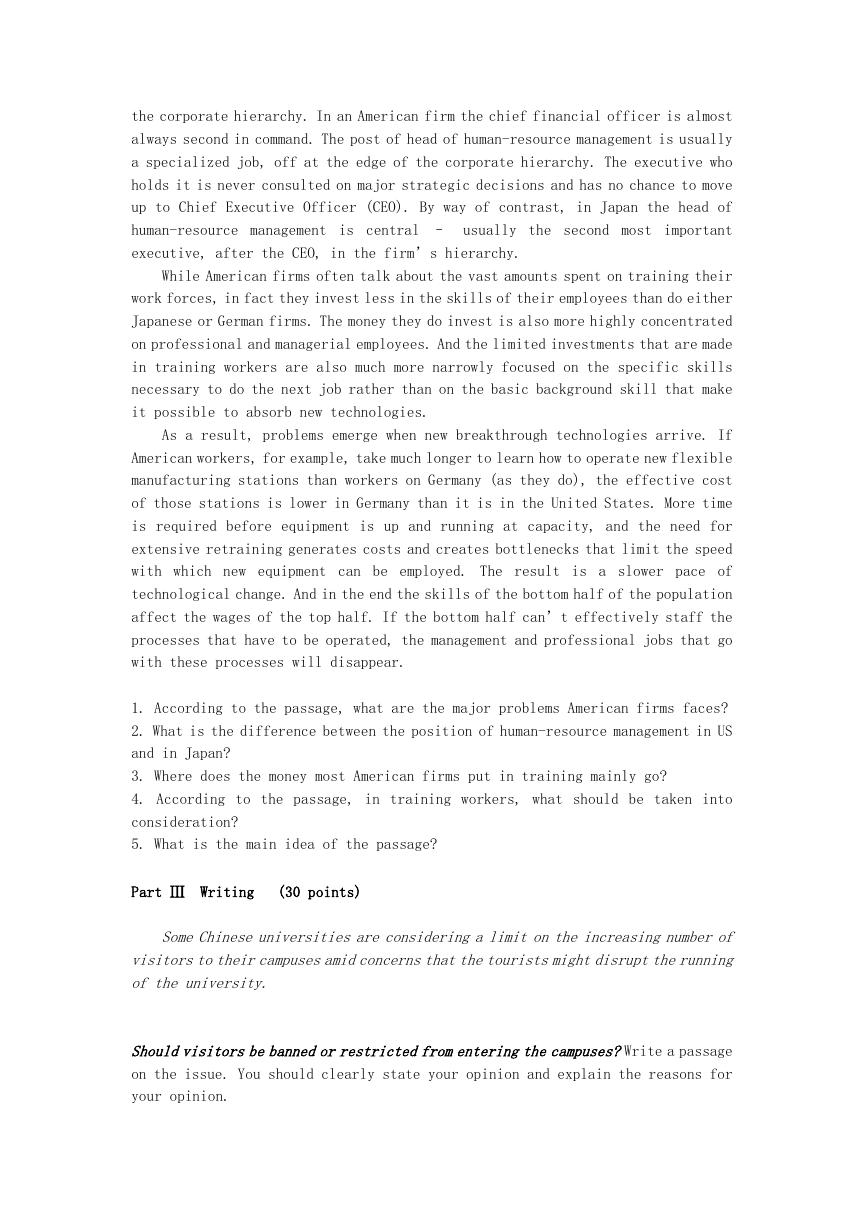








 2023年江西萍乡中考道德与法治真题及答案.doc
2023年江西萍乡中考道德与法治真题及答案.doc 2012年重庆南川中考生物真题及答案.doc
2012年重庆南川中考生物真题及答案.doc 2013年江西师范大学地理学综合及文艺理论基础考研真题.doc
2013年江西师范大学地理学综合及文艺理论基础考研真题.doc 2020年四川甘孜小升初语文真题及答案I卷.doc
2020年四川甘孜小升初语文真题及答案I卷.doc 2020年注册岩土工程师专业基础考试真题及答案.doc
2020年注册岩土工程师专业基础考试真题及答案.doc 2023-2024学年福建省厦门市九年级上学期数学月考试题及答案.doc
2023-2024学年福建省厦门市九年级上学期数学月考试题及答案.doc 2021-2022学年辽宁省沈阳市大东区九年级上学期语文期末试题及答案.doc
2021-2022学年辽宁省沈阳市大东区九年级上学期语文期末试题及答案.doc 2022-2023学年北京东城区初三第一学期物理期末试卷及答案.doc
2022-2023学年北京东城区初三第一学期物理期末试卷及答案.doc 2018上半年江西教师资格初中地理学科知识与教学能力真题及答案.doc
2018上半年江西教师资格初中地理学科知识与教学能力真题及答案.doc 2012年河北国家公务员申论考试真题及答案-省级.doc
2012年河北国家公务员申论考试真题及答案-省级.doc 2020-2021学年江苏省扬州市江都区邵樊片九年级上学期数学第一次质量检测试题及答案.doc
2020-2021学年江苏省扬州市江都区邵樊片九年级上学期数学第一次质量检测试题及答案.doc 2022下半年黑龙江教师资格证中学综合素质真题及答案.doc
2022下半年黑龙江教师资格证中学综合素质真题及答案.doc